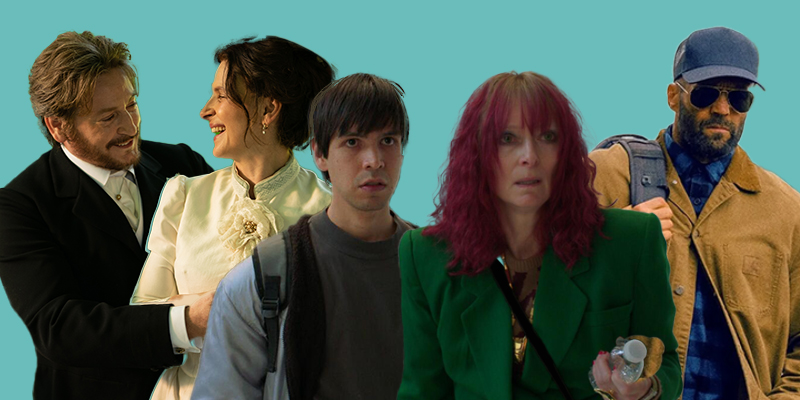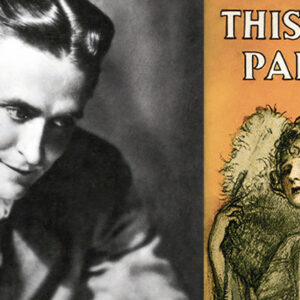Some of the Best (and Worst?) Movies of the Last Three Months
Olivia Rutigliano on Beekeeping Assassins, French Gourmands, Fanciful Toy Inventors and More
In a maddening twist, nearly 1/4th of 2024 has already passed. I can barely remember to date things with the correct year, let alone comprehend that it’s basically April. But it is, and I have the ticket stubs to show for it. In the last three months, I’ve seen a lot of movies. Here are some fun-sized reviews of movies that didn’t get long solo write-ups, from my last three months of moviegoing.
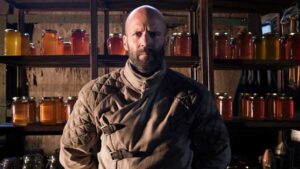
The Beekeeper
The Beekeeper is about a lot of things, but is mostly about how, if you try to scam the elderly, you deserve a violent punishment. Movies shouldn’t be judged on their morals or the perceived morality of their characters, but I’m just going to say that I’m glad someone out there is making a movie with this message.
Anyway, Jason Statham plays a beekeeper who takes his job very seriously. He loves beekeeping. It’s mostly what he talks about, and even when he talks about other things, it’s via beekeeping-themed metaphors. But then some phone scammers target his friend Phylicia Rashad and he goes on a revenge-fueled rampage. Turns out, he’s not just a beekeeper, he’s also a “beekeeper,” the name of a top-secret special-ops job. And he uses his super spy kills to start dismantling the scam syndicate for good. Is it an inane film? Yes. Does a character say “to bee or not to bee?” Yes. Should you see it? Yes. Everyone should see it, especially those of you entertaining the idea of conning old people out of money.

Problemista
Julio Torres’s Problemista is a surrealist fable about a young man, Alejandro, who arrives in New York City from El Salvador, hoping to become a toy designer. He, played by Torres (who also wrote and directed the film) is a fanciful, innocent, almost childlike young man. But when a series of misfortunes leaves him without his day job, and subsequently, without an immigration sponsor, he begins a meandering quest to steer his dreams back on track. But his savior, for whom he interns—a chaotic, clueless, middle-aged art critic played to stressful veracity by Tilda Swinton—might also be his undoing.
Ale, as our hero is known, sees the world differently than everyone else, and it is his personal perspective which supplies the film’s aesthetic, which often involve visual allegories and dream sequences and other magical tableaux. At times, moments from Problemista (as well as some of the toys Ale designs) feel like scrapped sketch ideas from Torres’s days as an SNL writer (where he brought the now-iconic “Wells for Boys” skit into being), but it doesn’t really matter. The whole thing pulls off whimsy and enchantment without losing any shred of sincerity, a feat if there ever were one.

The Taste of Things
The Taste of Things is a beautiful movie. It’s not a very vegetarian movie, if that’s a useful thing for you to know, but hey, neither is French cuisine, and that is what this movie is about. Well, it’s about more than simply cuisine, even more than cooking… the film, directed by Tran Anh Hung, takes a thorough, holistic, craft-based approach to the epicurean project, from growing ingredients to harvesting them to preparing them to combining them in dishes and combining dishes in courses and combining courses in menus.
Benoît Magimel plays Dodin Bouffant, a wealthy gourmand in rural 19th-century France. Juliette Binoche plays Eugénie, the gifted cook who works at his manor. The two are constant collaborators in every respect: cooking, work, love. Dodin wants to marry Eugénie, but she wants to keep their relationship the way it is, with their shared art at the center. A beautiful and sensual and tender movie.

Argylle
Look, I sat through King Kong the musical on Broadway. “Disasters” at the level of “finished productions” don’t scare me out of an audience. But I’m going to guess that you already know Argylle isn’t great, since it was panned pretty long and hard last month, when it came out. While I wasn’t impressed by Argylle either, I won’t dismantle it here, partially because I don’t know if I’d have anything new to add to the pile and partially because it feels like a waste of energy. The best piece of criticism I’ve read about the film was from Bilge Ebiri, the critic at Vulture, who remarked on Twitter that Matthew Vaughn (who wrote and directed Argylle as well as the Kingsman movies) isn’t a bad action director but is a bad storyteller, unlike his buddy Guy Ritchie who is a good storyteller but not a good action director. I agree with this!
Some of the action scenes in Argylle are well-done and enjoyable. And, narratively, the beginning of Argylle is enjoyable. It goes off the rails again and again (even when it seems that there are no more rails from which to go off, more rails appear seemingly for this purpose) but there are glimmers of creativity and organization and excitement throughout. You know the one thing I kind of loved about it? The casting of Sam Rockwell, an actor of eminent watchability and also a dancer of extreme natural talent. If Sam is in a movie, I’ll pay attention, but if Sam is allowed to dance in a movie (which he is, in Argylle), then I’ll be on the edge of my seat. But it’s the truth that such scenes were the only times in Argylle‘s 139-minute runtime that I was engaged enough in what was going on to even move my body, let alone sit up.

Snack Shack
I adored Snack Shack, the early 90s period piece/coming-of-age comedy from writer-director Adam Rehmeier. It’s about two goofball best friends, AJ (Conor Sherry) and Moose (Gabriel LaBelle, AKA Sammy Fabelman), growing up in Nebraska City in the summer of 1991. Exhorted to get a job by their exasperated parents after being caught in myriad shenanigans, these fourteen-year-old boys realize that they have an opportunity to run the snack shack at their community pool, and begin an entrepreneurial racket to strike it rich off hot dogs and candy bars.
The film feels classic in as many ways as can be (there’s a romance with the sexy girl-next-door/lifeguard, there are wise words from an older-brothery war veteran, there are a series of extravagant showdowns with neighborhood bullies), but, thanks to Rehmeier’s loving direction and countless earnest performances, these elements don’t feel cliché or overdone. Snack Shack‘s ethos of familiarity makes the whole thing go down like a memory, rather than déjà vu.
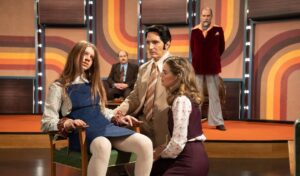
Late Night with the Devil
Late Night with the Devil is a fresh, bracing horror film from writer-directors Cameron and Colin Cairnes and producer-star David Dastmalchian. It has a crystalline premise. Get a load of this: a late night TV show host, desperate for better ratings, plans a broadcast that will catch audiences’ attentions. His program, which airs on Halloween night in 1977, includes appearances from psychics, paranormal debunkers, and a psychologist who claims to have been able to communicate with a demon inhabiting a possessed child. Oh, and… the possessed child, herself. She’s there too. So, of course, when the show commences, things go horribly wrong.
The film unfolds crisply, playing with a cinéma vérité style, as if we’re watching a behind-the-scenes broadcast about the apparently-famed broadcast, which includes material neverbefore seen. I love films that handle exposition creatively, and this one certainly does, though its sense of overarching structure does fade a bit as the film progresses (sometimes, later on, I wasn’t positive if we were watching the broadcast, the broadcast of the broadcast, or something else). Perhaps this is related, but at times (in the film’s revelatory third act, for example) it’s almost too economical; I would not have called the film heavyhanded if it provided a few more conclusive answers. Just a couple! I mean, the devil’s in the details! But these are quibbles. Overall, it’s a smartly-paced, original, and riveting horror movie. If you like scary movies of any kind, or if you like the very specific category of “movies about broadcast television,” this one’s for you.

Mean Girls
I doubt anyone needs my take on the movie–musical adaptation of the musical Mean Girls based on the movie Mean Girls, but here it is. I don’t know if it’s the multiple revisions that the original script went through to make it to this iteration, or if it was purposefully tailored to fit the seeming-wants of today’s era, but I found Mean Girls weirdly sanitized. “It was too woke,” I complained to my friend, laughing because I never thought I’d say that phrase as a criticism. Truly, I’ve never felt so old. Hear me out though… the original film is complex, more so than its adaptations give it credit for. Characters say strange things or reveal awkward qualities about themselves in ways that feel realistic, for better or for worse, like when Tina Fey’s Miss Norbury assumes the African exchange student in her class is a nearby Black girl rather than Lindsay Lohan. Miss Norbury’s slip-up is interesting, offers insight into her, makes her seem believable as a person.
But I was genuinely outraged that the movie musical excised the part of the original film where the school’s gym teacher, Coach Carr, is found to be having a relationship with one of his students; to me, moments like this formed the secret thesis of Mean Girls: that there are often real, insidious things going on in high schools and they can get drowned out by an overwhelming tide of rumors and drama. Instead of Coach Carr, Miss Norbury becomes the school’s focal scapegoat for a while. We’ve already seen her at her worst, and while it’s not amazing, it’s certainly not predatory. That’s an interesting dichotomy to be establishing, here! But the musical doesn’t give us anything this tough to chew on.
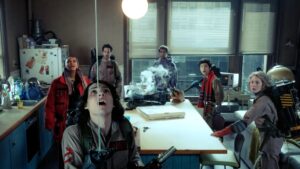
Ghostbusters: Frozen Empire
It’s kind of insane to me that Ghostbusters: Frozen Empire begins with a quote from the Robert Frost poem “Fire and Ice.” That should tell you all you need to know about this Ghostbusters installment (or the one that came before it, 2021’s Ghostbuster’s Afterlife): it’s a movie that doesn’t make sense as a vessel for any depth and yet tries very hard to dig deep. Many franchises have begun to The Force Awakens themselves (yes, that’s a verb). And following the deaths of both Harold Ramis and Ivan Reitman, it makes sense that a tribute reboot would rise. Don’t get me wrong, I enjoyed both new, heapingly-sentimental Ghostbusters movies, but let me warn you that their side effects may include feelings of confusion and shock, and lots of time spent recalling that the original two Ghostbusters movies were goofy, bawdy, and slapsticky by design. Anyway, the good thing about Ghostbusters: Frozen Empire is that it brings back the New Yorky stuff that feels so integral to the franchise that Afterlife eschewed (the old fire house, traffic hoopla, arguments down at City Hall).
In this movie, an ancient god of ice and maybe death escapes his prison and tries to build an army of the dead. But it’s also about the importance of F-A-M-I-L-Y, a theme that feels a little too simple and out-of-place in a film with monsters way too scary to show to kids.* Speaking of monsters, Ghostbusters: Frozen Empire also reminds us of one of the foundational tenets of creature design: the longer the fingers, the bigger the horns, the scarier the thing. “Tall, dark, and horny, 12 o’ clock” Bill Murray’s Peter Venkman laconically calls out when he first sees the icy, goat-like monster-god. That line might be the only real vestige of the original franchise’s cock-and-bull sense of self.
*Who is the target audience for these two reboots? I’m dying to know.

